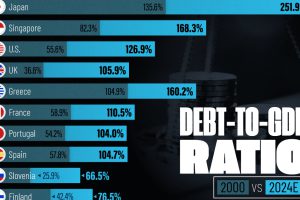
Are You Financially Literate?
If you’ve ever paid attention to any report on financial literacy from around the world, you’ll likely know that the results aren’t exactly awe-inspiring.
For example, according to one global survey, only about 33% of adults are financially literate.
Americans tend to fare better on average, but not as much as you might imagine. In fact, as we showed in our infographic on the Financial Literacy Problem, one ongoing survey actually sees average U.S. performance slowly dropping over time.
It raises the question: what do people actually know about money, investing, and wealth?
Investment Literacy
A recent poll by Lexington Law aimed to get a sense of U.S. financial literacy, with a focus on basic investment knowledge on stocks, bonds, and building a safe portfolio.
Specifically, it asked 4,000 Americans four different multiple choice questions:
- What is the safest investment type?
- What happens to bond prices when interest rates rise?
- What is a bull market?
- What happens to your stock if a company goes bankrupt?
If you think you know the answers to even two of these questions, you are off to a good start!
The survey ultimately found that the average score on this test was 48.8% – meaning that Americans get slightly fewer than two questions correct on average.
Cheat Sheet
Question #1: Safest Investment
Based on the options provided on the multiple choice, the correct answer was Treasury Bonds. Roughly 53% of Americans would get this right, if asked.
Question #2: Bond Prices
Only 25% of respondents said that bond prices would decrease if interest rates rise, which is the correct answer. To be fair, this relationship is somewhat counterintuitive.
Question #3: Bull Market
With the current bull market becoming the longest in history this month, this terminology has been all over the news. That said, just 53% of respondents understood a bull market to be a period in which stock prices are expected to rise.
Question #4: Bankruptcy
If you own a stock and the company goes bankrupt, what happens? Interestingly, people fared best on this question, with 64% realizing that the stock becomes “virtually worthless”. It’s worth noting, however, that a 64% success rate is still the grading equivalent of a “D”.
How did you do on this test – are you financially literate about investments? Where did you go wrong?
If you need to brush up on investing knowledge, don’t forget to visit our Wealth 101 project that features easy-to-use infographics about personal finance topics.





